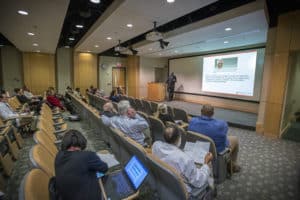Guest Lecture Addresses Bias toward Health Care Workers
| What should doctors, nurses or other health care providers do when a patient makes a request that seems discriminatory?
Leon McDougle, M.D., M.P.H., chief diversity officer and professor at the Ohio State University Wexner Medical Center, was a guest of the UAMS Division for Diversity, Equity and Inclusion to discuss precisely that situation in a Feb. 26 guest lecture “Credentials Don’t Shield Healthcare Professionals from Bias.”

Attendees listen before breaking into small groups to discuss and react to case studies presented by McDougle.
McDougle presented survey results showing that a majority of providers – nurses, doctors, physician assists, etc. – have experienced a patient making an offensive remark about them that was a biased. And that held true regardless of race or gender.
“It’s not a black-white thing,” McDougle said, presenting the results. “It’s across all races and ethnicities. And we don’t get a lot of training for when someone makes a negative comment about an attribute that we can’t control like our gender, race and ethnicity. So how do you respond? Is the old saying true that the customer is always right?”
To inspire the discussion, McDougle presented three case studies, each a conglomeration of real events in which health care providers ran up against some form of discrimination, and asked the several dozen audience members to discuss the cases and consider the results.
In one a Mexican American nurse encountered a patient’s spouse who did not want the nurse involved with care of their baby. Another was an African American male doctor whose patient wanted only white or female doctors. A third was a social worker who kept having a sticker identifying the office as a safe zone for LGBTQ+ patients removed.
Audience members routinely emphasized that they felt it was incumbent upon institutional leadership to a take a leading role in setting policies that would not accept such behavior. Over the past several years these occurrences of bias have greatly increased and medical centers have needed to develop new policies to inform patients that such behavior is not okay.
Certain medical professionals in the audience acknowledged that, at some point, there’s only so much they can do if a patient will not work with them. However, once an act of bias occurs, patients should be given an opportunity to change their behavior prior to considering transfer of care to another hospital.
Discussion then pointed out the stress this can cause for those professionals.
It’s important to build up your resilience. “You need to get proper rest and sleep. Whatever your spiritual life is, you need to keep it together,” he said.

The interactive presentation included many questions about handling bias as a health care professional.
“Build a network of allies and support,” McDougle advised. “You shouldn’t have to be the one defending yourself from micro-aggressions and bias all the time. You’re fantastic at your job, so before it even becomes an issue, your colleagues should be there shutting it down.”
McDougle also emphasized that diversity and inclusion work best as a whole-team exercise, and Brian Gittens, Ed.D., vice chancellor for diversity, equity and inclusion at UAMS, noted that’s his philosophy.
“You’ve heard me use the term inclusive excellence, and one of the important tenets of that is that it’s everybody’s responsibility,” he said. “In terms of vision, we have to have accountability and humility, because those complement the ecosystem of people doing the right things. We want everyone to ‘get it.’ We want an inclusive environment for all of us.”
